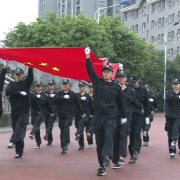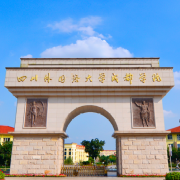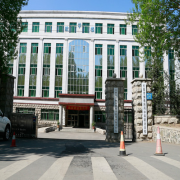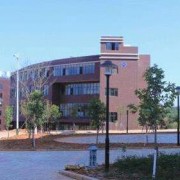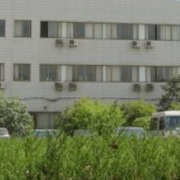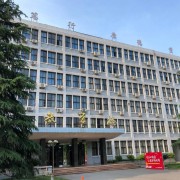机械英语翻译 机械英文翻译
来源:择校网 时间:2025-03-02 06:05:22
一、机械专业英语翻译 英译汉
1. There is nearly a limitless variety of materials. The method to understand them is to consider all
materials as members of a big family. Materials that possess common characteristics are placed into
their own group within the family. Although overlaps exist in the grouping system, it is easier to understand
materials when relationships are identified.
材料的种类有无限多。认识他们的办法就是把所有的材料按科来分类。具有普通性能的材料分为一科,尽
管这样分科会出现重复情况,但这样分类很容易了解他们的关系。
2. The properties of a material are those characteristics that help modify and distinguish one material from
another. All properties are observable and most can be measured quantitatively. Properties are classified
into two main groups, physical and chemical properties. Physical properties involve no change in the
composition of the material. Chemical properties are associated with the transformation of one material
into another. Physical properties are, in turn, arbitrarily subdivided into many categories.
属性有助于人们更改和分辨各种材料。所有的属性都是可见的,大多数还可以量化。通常可以分为两大
类,物理性质和化学性质。物理性质包括材料成份的不变性。而化学性质通常为从一种材料转变为另一
种材料。然而,物理性质分类也很多。
第 1页
3. These subdivisions bear names such as mechanical metallurgical, fabrication, general, magnetic,
electrical, thermal, optical, thermonuclear, and electro-optical. Regardless of the name of the subdivision,
physical properties result from the response of the materials to some environmental variable, such as a
mechanical force, a temperature change, or an electro-magnetic field. It can be divided primarily into
mechanical, thermal, electrical, magnetic, and optical properties.
这些分类都有相应的名称如机械冶金类,制造类,通用类,磁类,电气类,热学类,光学类,高热原子
核反应类和电光类。无论其分类的名称是什么,物理性质会随着某些环境改变,如机械力,温度变化或
者电磁场的改变而改变。它可以大致分为机械,热学,电气,磁和光学性质。
4. Among other characteristics, we can list the following for the ideal material: endless and readily
available source of supply; cheap to refine and produce; energy efficient; strong, stiff and dimensionally
stable at all temperatures; lightweight; corrosion resistant; no harmful effects on the environment or
people; biodegradable; numerous secondary uses.
而针对其他的特性,我们可以理想的把他们分为:可无限使用,提炼和生产便宜,能源充足,在任何温
度下都保持坚硬,外形稳定,轻质,防腐,环保,无害,可分解,大量二次使用。
5. Technically, forging maybe defined as the process of giving metal in creased utility by shaping it,
refining it, and improving its mechanical properties through controlled plastic deformation under impact or
pressure.
专业地讲,锻造可以定义为通过修整成形,提炼而使金属增强其使用性,并通过在施强压的情况下控制
其塑性变形来改善其机械性能的一种方法。
6. Hardening is a process of heating and cool steel to increase its hardness and tensile strength, to
reduce its ductility, and to obtain a fine grain structure. By tempering or“drawing”, the hardness and
brittleness may be reduced to the desired point for service conditions.
淬火是对钢材进行加热和冷却来增强硬度和抗拉强度,减小延展性能,以获取精炼质地结构的一种过程
。
7. Belts and chains are used to connect two or more shaft for the transmission of rotation and power. The
shafts may be at a considerable from one another, while belts also permit a certain amount of twist. A cam
and its follower together form a mechanism that converts rotary motion or oscillating motion, into a cyclical
linear or angular motion.
8. Electro-discharge machining is mainly used for drilling, broaching, engraving, embossing, and thread
cutting and similar to turning, milling, and grinding
放电机械主要用来钻,铰,刻,压花和螺纹切割以及类似于车工工艺,铣和磨的工艺。
第 2页
9. From an operating standpoint, any hydraulic system can be divided into four logical segments: the
power input segment, the power transmission system, the control devices and the power output portion.
从操作性观点出发,任何液压系统都能在逻辑上划分为四类:动力输入,动力转换,控制设备和动力输出。
第7点不知道怎么翻译、
二、机械专业英语翻译软件
Mechanical Properties of Metals金属的力学性质
Mechanical properties are the characteristic responses of a material to applied forces. Knowledge of mechanical properties of materials is essential in order to construct a mechanically sound structure such as a bridge on the river.
力学性质指的是材料面对作用力时表现出来的特征。而研究力学性质其本质上就是为了建造可靠的机械结构——例如河面上的桥。
Mechanical properties can be determined by conducting experimental tests on the material samples. Some important mechanical properties of materials are: strength(in tension, compression, shear, bending and torsion), stiffness(strength), ductility, impact strength, hardness and toughness.
力学性质可以由对材料样本进行实验检验的方法测试出来。一些关键的机械特性包括强度(包括承受拉应力,压应力,剪应力,弯曲力和扭力),刚度(强度),延展性,冲击强度,硬度以及韧度
1. Strength
强度
The Strength of a material may be defined as the ability of the material to sustain loads without undue distortion or failure. Material should be adequately strong when subjected to tension, compression, shear, bending or torsion as per the intended use. For example, the crankshaft of an automobile should have sufficient torsion strength.�材料的强度基本是被定义为材料在发生变形或失效之前所能承受的负荷大小。根据材料各自用途不同,其必须具有足够的抗拉、抗压、抗剪、抗弯或是抗扭强度。例如汽车上的曲轴就必须具有足够的扭转强度。
2. Stiffness
刚度
Stiffness is the ability of a material or shape to resist elastic deflection. For identical shapes, the stiffness is proportional to the modulus of elasticity. A material which deforms less under a given load is stiffer than one which deforms more.
刚度衡量的是材料抗弹性形变的能力。对于同样形状的材料,刚度与弹性模量是成比例的。相同负荷下变形较小的材料具有比变形大的材料更高的强度。
3. Ductility
延展性
Ductility refers to the capacity of a material to undergo deformation under tension without rupture as in a wire drawing operation.�
延展性指的是材料在承受拉应力时发生变形而不断裂的能力,就像在拔丝一样。
4. Impact Strength

冲击强度
Impact strength is the strength of a material when subjected to high rates of loading, usually in bending, tension or torsion. The amount of energy required to fracture the material by a single blow is measured by means of a Charpy impact test.冲击强度是指材料在承受高速率的负荷时的强度,通常是弯曲应力,拉应力或者是扭力。单次冲击破坏材料所需的能量通过却贝摆锤冲击测试的方法测得。
5. Hardness
硬度
Hardness is the resistance of a material to plastic deformation usually by indentation. However, the term may refer to stiffness or refer to resistance to scratching, abrasion or cutting. Tests, such as Vickers, Briell and Rockwell, are generally employed to measure hardness.
硬度通常指的是材料在遭受压入时产生的塑性变形。此外,这个词还可能指代刚度或是材料的抗刮伤、抗磨损、抗剪切的能力。维氏硬度,布氏硬度和洛氏硬度测试等测试方法通常被用来测量硬度。
6. Toughness韧度
Toughness refers to the ability of a material to withstand bending or the application of shear stresses without fracture. By this definition, copper is extremely tough but cast iron is not.
韧度是指材料在承受弯曲应力或剪切应力时不发生破裂的能力。从这个意义上来讲,铜是韧性最好的而铸铁是最差的
Materials Sustain Loads On Tension
Materials Sustain Loads On Shear
Materials Sustain Loads on bending
Materials Sustain Loads on torsion
后面的应该是图旁边配的说明,没翻
......
三、机械英文翻译
最尖端沿立铣床的边通常是平直的和可以通过研有时逐渐变细在工具,并且切削刀研磨机这样对于模子是必需的草稿和死洞可以自动地引起。进一步,末端面孔可以与边相符正常情况或为碾碎的三维等高将使用的球端形例如死洞。如Fig.7.10所显示,它可能也有碾碎的特别圆的渐近的口袋圆角落。
大号立铣床称圆筒形端铣刀,没有任何小腿,并且可以在一个中央孔帮助下登上。结果这些可以用于水平的轴并且垂直的轴铣床。如Fig.7.9所显示,这些在纺锤上的一个残余部分树荫处帮助下将登上。
Face铣刀(Fig.7.12)为用机器制造大,平面使用。他们有在面孔和周围的先锋。他们任意直接地在纺锤的鼻子通常登上与整个面孔的为用机器制造。当那些在边为清洗表面时,使用在面孔的牙做大多数用机器制造。这些通常由碳化物插入物品种制成由于大物质撤除,虽然也使用高速钢。与铣刀指定相关的以下期限是常用的。裁减Hand这提到切削刀被转动的方向。当观看往纺锤,当切削刀是明智时移动的逆的时钟它称右手自转,当对面称左手自转时。螺旋Hand在螺线铣刀的情况下,当观看从末端,如果长笛朝时钟明智的方向行动它称右手螺旋,当对面称左手螺旋时。轴向切削力方向取决于螺旋的手。如果不同的螺旋二把铣刀肩并肩在帮会碾碎的操作被安排,净轴向力可以减少到零根据其中每一把采取的裁减铣刀。应该考虑选择一把铣刀的While为一种特定应用下列问题。
(i)使用标准工具若情况许可。
(ii)使用从纺锤和最大的可能的架置类型的短的突出物。
(iii)大于裁减(端铣)的宽度选择一条切削刀直径30%。
(iv)首先使用一把接近的沥青切削刀作为选择。
(v)为长期使用一把粗糙的沥青切削刀垂悬和不稳定的情况。
(vi)简称使用切削材料和裁减的小辐形深度一把额外接近的沥青切削刀。
The平板铣刀可能有切口牙,可以是平直和平行的与转动轴。如Fig.7.13所显示,或者他们可以是有一个角度到沿螺旋的轴。
好了,文章到此结束,希望可以帮助到大家。
